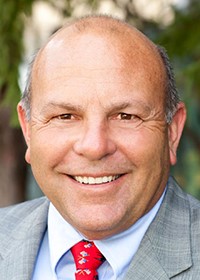Farm Bureau leader lauds Boozman, talks ag advocacy in Rogers
by July 24, 2022 9:34 am 2,462 views

Arkansas Farm Bureau President Rich Hillman, from left, U.S. Senator John Boozman (R-AR) and American Farm Bureau Federation President Zippy Duvall on Friday (July 22) in Rogers.
The nation’s top agriculture lobby leader visited Northwest Arkansas on Friday (July 22) to present the state’s senior senator with its highest congressional honor.
For his focus on agriculture and the economy, U.S. Sen. John Boozman, R-Ark., of Rogers received the Golden Plow award from American Farm Bureau Federation (AFBF) President Zippy Duvall during a luncheon at the Arkansas Farm Bureau’s mid-summer Officers & Leaders conference at the Rogers Convention Center.
Boozman is the ranking member of the Senate Agriculture, Nutrition and Forestry Committee. He is in his second term as senator after five terms in the U.S. House of Representatives. The senator is a 10-time Friend of Farm Bureau, which is awarded to members of Congress who have supported Farm Bureau’s policy positions.
“For two decades, Senator Boozman has demonstrated his commitment to agriculture and farmers across the country. His unwavering support for hardworking farm families has earned him Friend of Farm Bureau award for 10 consecutive sessions, so presenting him with the Golden Plow award seems only natural,” Duvall said. “Senator Boozman knows the key to good policy is consensus. He’s willing to work with lawmakers on both sides of the aisle to meet the needs of farmers and ranchers while ensuring America’s families continue to enjoy a stable food supply.”
Arkansas Farm Bureau Rich Hillman, a rice farmer from Carlisle, nominated Boozman for the award.
“Senator John Boozman is a champion for agriculture,” Hillman said. “Our nation’s farmers and ranchers could not be better served than we are with John Boozman leading agriculture policy efforts in the U.S. Senate. He epitomizes the spirit of the Golden Plow award.
Boozman, up for re-election in the fall, is the third Arkansas lawmaker and first Republican to earn the Golden Plow, following Sen. David Pryor, D-Ark., (1989) and Sen. Blanche Lincoln, D-Ark. (2008). Boozman faces Libertarian Kenneth Cates, Democrat Natalie James, and Independent Stuart Shirrell in the November general election.
Winter weather delayed the AFBF’s plans to present the award to Boozman earlier this year.
“This truly is an honor,” Boozman said. “I’m a guy who believes the best ideas come from the ground up, which is why the voices of the American Farm Bureau Federation and the Arkansas Farm Bureau carry so much weight in my book. We have stood side by side on numerous battles over the years, and I can tell you those outcomes would have been much different had the Farm Bureau not been there. I will always rely on the Farm Bureau’s input to guide our policy decisions in Washington.”
The Arkansas Farm Bureau conference attracted about 500 leaders to Rogers. The Farm Bureau promotes agriculture and advocates for roughly 190,000 farm families throughout Arkansas. Its membership is the 8th largest in the U.S.
LIFETIME ADVOCATE
Duvall, 66, is a poultry, beef and hay farmer from Georgia. He oversees a 400-head beef cow herd at his farm about 80 miles east of Atlanta in Greensboro. He was elected AFBF’s 12th president in 2016 and was re-elected to a fourth two-year term earlier this year. He will run for a fifth term in 2024.
“As long as I’m healthy and people like what I’m doing, yeah, I plan to run for re-election,” he said.

In an interview with the Northwest Arkansas Business Journal on Friday, Duvall, who is a third-generation farmer, said his interest in agriculture advocacy started at an early age.
“I remember complaining to my father at the breakfast table about regulations as a young man,” he joked. “He said, ‘If you want to make a difference in your life in that area, you’ve got to get outside your fencerows.’ So, he took me to a Farm Bureau meeting.”
Duvall took his dad’s advice to heart. He started as a volunteer at a local Farm Bureau chapter and has been involved in advocacy at the county, state and national levels ever since.
Before becoming AFBF president, he was Georgia Farm Bureau president for a decade and served on the AFBF board of directors. In 1987, he also did a year on the AFBF board as Young Farmer Committee chair.
“I discovered one voice is like a lone wolf in the distance,” he said. “If you join up with an organization like Farm Bureau with many voices, sometimes you get heard. Most of the time, you get heard.”
A typical workday for Duvall involves building relationships with lawmakers to explain what farmers need in terms of U.S. agricultural policy — a multiyear law known as the farm bill.
Congress passes a new farm bill every five years to govern various agricultural and food programs. In December 2018, Congress passed the last farm bill. Stakeholders such as the AFBF have already started giving input on the next farm bill. It’s expected to be negotiated in early 2023.
“I finished up [Thursday] spending two hours with Senator Boozman and my new executive vice president [Joby Young] talking about how we can work with him to make sure we can create another farm bill that’s bipartisan,” Duvall said. “What we’re looking for is premature for me to say because we have a working group made up of all 50 [state] Farm Bureaus, and our guidance will come through their policy discussions and the grassroots like the men and women that are here [in Rogers] today.”
Duvall said he hopes the next farm bill maintains an emphasis on crop insurance risk management.
“We’re very interested in keeping the conservation title funded,” he said. “Even more so because there are more requests to be part of conservation programs than there is money.”
A farm bill’s conservation title generally includes reauthorizations, amendments, and new programs encouraging farmers and ranchers to use resource-conserving practices on their land.
Duvall said it’s a given that conservation efforts are expanding as more farms adopt climate-smart production practices, which can offer considerable economic benefits.
“The world is demanding that,” Duvall said. “As long as it’s voluntary, based on the market and what the science says, our farmers have repeatedly proven that they will offer themselves up voluntarily to those practices. We all want to leave our farms in better shape than we found them.”
Duvall also talked about supply chain relief that U.S. producers and consumers can expect from the recently enacted Ocean Shipping Reform Act. President Biden signed the bipartisan law in June. Duvall stood next to the president as he signed it.
During the pandemic, rising demand clogged the supply chain at sea, which increased ocean-going shipping costs from Asia to the U.S. by as much as 1,000%.
Duvall said the price-gouging put farmers at a disadvantage because the extra costs meant they couldn’t be competitive on the market. The law aims at carriers or terminal operators who unreasonably refuse to open up available cargo space.
“I haven’t had any reports back [since the bill signing], but there’s no way it cannot help,” Duvall said. “There needed to be some oversight in that area. Foreign countries own many shipping companies, and if you own them, you can manipulate them. And they were manipulating it to their advantage. To the disadvantage of our farmers and ranchers. That needed to be done, and we were very proud to work with this administration, this president and this Congress to get that done.”
